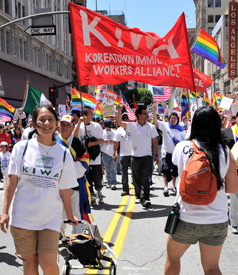Chicago – If I were a member of the third largest minority group in the United States, I’d be really frustrated that the immigration issue continues to be discussed almost exclusively with Latin Americans in mind.
As immigrants’ rights advocacy groups across the country wonder whether there’s even a slim chance Congress will take up debate about comprehensive reform anytime soon, recent national conversations have been set exclusively in the context of the Latino vote and Republican Hispanics.
Despite President Obama’s failure so far to deliver on his campaign promise to shepherd through meaningful reforms, Latinos turned out to help Democrats hold a few hotly contested seats. Paradoxically, Hispanics also boosted the Republican Party by helping elect several high-profile Latinos who had few ideas for solving our current illegal immigration woes and instead campaigned on tighter border controls and stepped-up enforcement.
This Latino-centric immigration narrative, while reflective of the population and a key to Hispanic political empowerment, excludes many who also have a stake in this debate.
“It is really frustrating to be mostly left out of the conversation,” said Karen Narasaki, president and executive director of the Asian American Justice Center, which advocates for the rights and interests of the Asian-American and Pacific Islander communities. “Mostly it’s because the Asian-American vote is missing — the media do not sample the Asian vote to tell what we’re really voting on.”
Compared to the 9 percent of eligible voters who are Latino, Narasaki estimated the Asian vote represents about 5 percent of eligible voters.
“That ‘5 percent nationally’ gets lost because we’re heavily concentrated on the West Coast, New York, and in California, which has the largest Asian population,” Narasaki told me. “We believe we contributed probably 6 to 7 percent of the vote in Sen. (Barbara) Boxer’s race. In Las Vegas, where we’re one of the nation’s fastest growing populations, (Senate Majority Leader Harry) Reid courted the Asian vote and got it. These are working-class Asians who got together for him but we get lumped into the category of ‘other immigrant voters.'”
Census and other studies have put the number of all illegal immigrants in the U.S. at approximately 12 million. About 1.5 million are Asians — representing 12 percent of the total Asian population — with 23 percent estimated to be Chinese, 17 percent Filipino, 14 percent Indian, 11 percent Koreans and the balance from a variety of smaller countries, all with different issues.
For instance, huge backlogs exist in families where immigrant citizens or legal permanent residents can bring spouses, parents and minor children from overseas. Their wait times are heartbreaking. The longest is for Filipinos, Narasaki said — they currently must wait about 19 years to reunite with family members. Chinese and Indians face up to nine-year waits.
Then there are the concerns of refugees from Southeast Asian countries such as Vietnam, Cambodia, Laos and Burma who are wary about strict filing deadlines for asylum claims and crackdowns on deportations for minor criminal offenses.
Indians — a highly skilled subgroup of Asians who tend to come into the U.S. on H1B visas — are, according to the U.S. Department of Homeland Security, the fastest-growing group of illegal immigrants. But if they lose a job, they have a limited window, sometimes only days, in which to find another before losing their legal status. In such a difficult housing market, homeowning Indians and their U.S.-born children are choosing to stay illegally.
All this makes Asians a mystery to the political parties in which they must gain a foothold to influence immigration reform and other priorities. “The parties have under-invested in us,” Narasaki said. “The Republicans think that because Asians are a minority they must be Democrats and the Democrats think that because Asians are business people, they must be Republicans.” Though a 2006 exit poll showed 79 percent of Asian-Americans voted Democratic, she added: “In the Asian-American community a lot of the vote is up for grabs — depending on the region there’s a lot of independence.”
We need diverse Asian and other viewpoints in the national conversation about voting blocs and how to deal with immigration law reform. Their experiences are exactly what voters and elected officials need in order to get past their preconceived notions of who would benefit from an overhaul of our current system.
Esther Cepeda’s e-mail address is estherjcepeda(at)washpost.com.
(c) 2010, Washington Post Writers Group
Before Midnight: Last Chance to Have Your Gift Matched!
Before midnight tonight, all donations to Truthout will be matched dollar for dollar up to $15,000! Thanks to a generous supporter, your one-time gift today will be matched immediately. As well, your monthly donation will be matched for the whole first year, doubling your impact.
We have just a few hours left to raise $15,000 and receive the full match.
This matching gift comes at a critical time. As Trump attempts to silence dissenting voices and oppositional nonprofits, reader support is our best defense against the right-wing agenda.
Help Truthout confront Trump’s fascism in 2026, and have your donation matched now!
